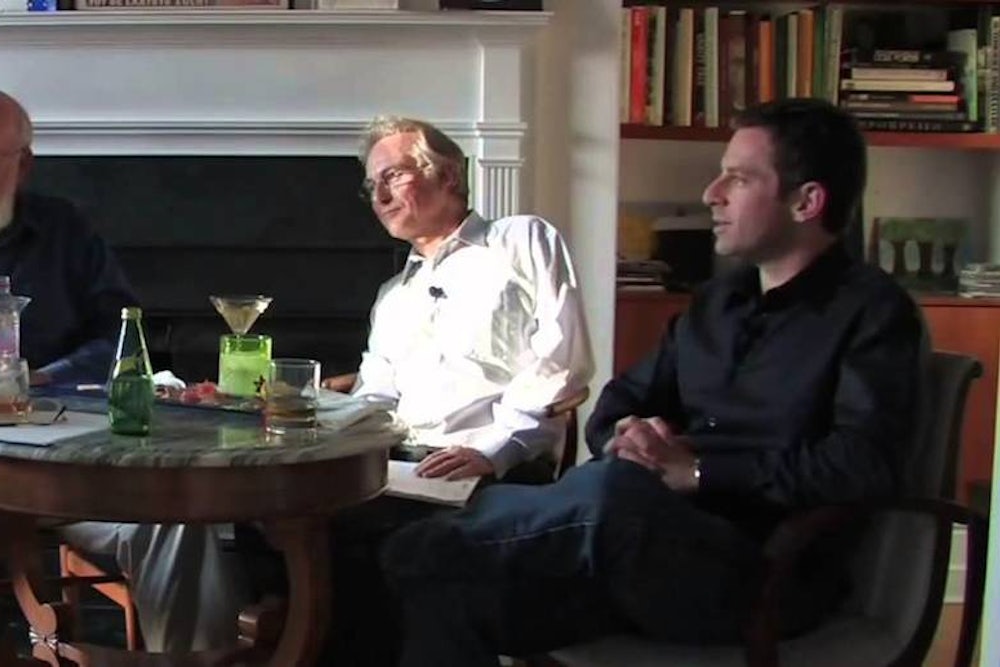Religious people and “faitheists”—my term for nonbelievers who feel that religion is good for society as a whole—have been using a new strategy against atheists. Like good debaters, they aim to put us on the defensive, insisting that we deal with this or that Deep Theological Book (the latest “must-read” is David Bentley Hart’s The Experience of God: Being, Consciousness, Bliss), or we answer this or that argument, or we read every “sophisticated” theologian in the history of Christianity. And if we don’t, well, then they won’t regard us as serious atheists. (As if they would anyway!) But I also realized that we can turn the tables on these people. After all, they’re the ones making unevidenced claims about reality, not us. So I propose that, when debating the religious, nonbelievers start using two tu quoque arguments.
Make believers read about nonbelief before you’ll listen to them. I’ve suggested this tactic before. Let us inform religious folk that we won’t pay attention to their superstitions, or their criticisms of atheism, until they’ve read The Very Best of Atheist Thought. These works must include the books of the Four Horsemen: Richard Dawkins, Daniel Dennett, Sam Harris, and Christopher Hitchens (one would think the faithful would already have read these, but their misunderstandings about The God Delusion lead me to believe otherwise); the complete works of Robert G. Ingersoll; selected readings from Mencken and Bertrand Russell; Christopher Hitchens’s The Portable Atheist, selected writings of Hume; Walter Kaufmann’s The Faith of a Heretic and Critique of Religion and Philosophy; George Smith’s Atheism: The Case Against God, and Herman Philipse’s superb God in the Age of Science: A Critique of Religious Reason. After all, if you’re attacking atheism, you must attack it in its strongest forms.
And if people can fault us for not reading Aquinas, Augustine, Origen, Tertullian, and modern theologians like Hart and Alvin Plantinga, well, then, why not ask something similar of them? If they haven’t steeped themselves extensively in the honorable tradition of secularism, then they have no credibility as believers.
But we also have another ace in the hole:
Make atheism-of-the-gaps arguments. Religionists often float God-of-the-gaps arguments, saying that evidence for God lies in the interstices of our scientific understanding. The most frequently cited gaps are the sciences’s failure to provide complete explanations of consciousness, morality, our sense of beauty, and why there is something in the universe instead of nothing. The argument-from-gaps depends, of course, on the claim that science will never be able to explain these things, but that makes the argument vulnerable to unforeseen advances. The greatest gap that ever adduced God was our inability to explain the presence of all the Earth’s species, and why they seemed so marvelously adapted to their environments. That was dispositive evidence for the supernatural—until Darwin explained it away in 1859 as the result of the purely naturalistic processes of evolution and natural selection. Who saw that coming?
But we can play the Gap Game, too. There are huge gaps in believers’ understanding of God, and in those lacunae, I claim, lies strong evidence for No God. Here are a few religious gaps:
- Why would the Abrahamic God, all-loving and all-powerful, allow natural evils to torment and kill people? Why can’t he keep kids from getting cancer, or stay the waves of tsunamis?
- Why, if God so ardently wants us to know and accept him, does he hide himself from humanity? And, since modern humans originated over 100,000 years ago, why did God wait 98,000 years before sending his son to redress our sins—and then to only a small portion of humanity within a hundred miles of Jerusalem? Or, if you’re sufficiently sophisticated to see God not as a bearded spirit but as The Ground of All Being, why isn’t that Ground obvious to everyone?
- Why would an omnibenevolent God consign sinners to an eternity of horrible torment for crimes that don’t warrant such punishment? Official Catholic doctrine, for instance, is that unconfessed homosexual acts doom you eternal immolation in molten sulfur. That’s unconscionable. And would a loving God really let someone burn forever because they were Jews, or didn’t get baptized?
- Why is God in the Old Testament such a narcissistic bully, toying with people for his amusement, ordering genocides in which innocent women and children are killed en masse, and demanding the death of those who work on the Sabbath? How does that comport with the God that Christians and Jews worship today?
- Why didn’t Jesus return during his followers’ lifetime, as he promised?
- How do any believers know for sure that their faith is the right one, especially given the presumed penalty for guessing wrong?
Now it’s no use for believers to respond, “God is mysterious. Perhaps some day we’ll know the answers.” For that is precisely the answer they won’t accept about the scientific puzzles, like the oft-touted “mystery” of consciousness that they use as evidence for God. If scientists were to respond likewise by saying, “The brain works in mysterious ways,” or “Evolution works in mysterious ways,” theists would simply sneer, for they can’t see the beam in their own eye.
In the end, religion, despite centuries of theologizing, hasn’t begun to provide credible answers to the goddy puzzles above. Ergo, there remains good evidence for atheism in the yawning gaps of religious understanding. And our own tactic is far superior to God-of-the-gaps arguments, since the gaps in science grow smaller as we learn more (neuroscience is one example). In contrast, the gaps in theism never narrow.
